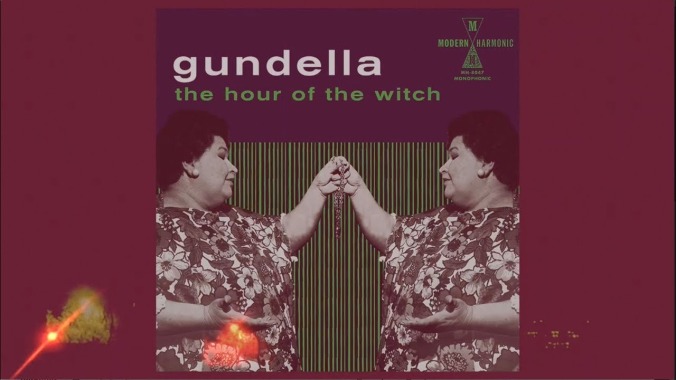A witchy album, a book for wanderers, and a group getting women behind the boards

Three staffers, three unabashed recommendations.
The Hour Of The Witch, Gundella
Right at the intersection of my interests in weird novelty records and the witchcraft trend of the late ’60s is The Hour Of The Witch, a 1971 album released by Detroit native Gundella, a.k.a. Marion Clark. Gundella claimed to come from a long line of Scottish witches who smeared their faces with green paint, indicating to which coven they belonged. That sounds suspiciously Wizard Of Oz-inspired to me, but you can’t knock Gundella’s sense of showmanship, explaining the mechanics of reincarnation and spell casting over canned thunder and ambient theremin. Aside from the charmingly eerie background music, the most remarkable thing about Gundella is her motherly presence, emphasized by her Midwestern accent. “There are many Johnny come-lately covens around today, people who want to be witches and can’t get into a traditional coven, and started forming one of their own. This is all right, I suppose,” she says; she couldn’t be that concerned with protecting the old ways from interlopers, though, as she released a spoken-word album explaining in detail how to cast spells, most of them love spells. Specialty label Modern Harmonic recently re-released The Hour Of The Witch on CD and green vinyl; you can also find a lower-quality version of the album on YouTube, but the record comes with a 16-page spell book, and if you’re anything like me, you can’t resist a vintage spell book. [Katie Rife]
Cities I’ve Never Lived In, Sara Majka
Sara Majka’s 2016 debut short story collection is a gorgeous, heartbreakingly sad book. Cities I’ve Never Lived In portrays the kind of sadness that soaks into one’s bones over a lifetime, a way of being as opposed to the result of a specific trauma, though traumas certainly take place here. Fatal car accidents, child abductions, abandonment, heartbreak—while they would certainly merit it, Majka does not depict these occurrences dramatically. The prose is spare and melancholy; Majka’s is a quiet voice talking plainly. Akin to works by Lucia Berlin and Joy Williams, one story bleeds into the next, making the collection a cohesive whole. Details from the narrator’s life repeat—her father’s leaving, her divorce—as does her way of seeing the world. As lonely wanderers, Anne and the people she encounters walk empty museums, sleep in strangers’ apartments, drink in bars at dusk. They move from place to place in hopes of finding if not happiness, then an alleviation of their weariness. I’m told (by Maine native and Odette author Sara Gelston) that the book’s New England setting and mood, in particular, ring true, yet anyone who seeks out unfamiliar spaces to make a home in, however temporary, should find this book familiar. [Laura Adamczyk]
Women’s Audio Mission
Look up the production credits on your favorite records, and there’s only a 5 percent chance you’ll find a woman’s name next to the words “produced by.” (And the few women who do produce or engineer behind the scenes often face—as Björk, for one, has vocally noted—difficulty being heard or recognized in these roles.) More folks than ever are talking about this gender gap and more female artists are getting behind the boards themselves, but one of the coolest efforts I’ve seen to combat that abysmal statistic is Women’s Audio Mission. WAM is a Bay Area nonprofit founded in 2003 to train girls and women in recording arts and production, with upward of 1,200 students now passing through its doors annually and many others using its web-based resources. Even if you’re not a woman or aspiring audio professional yourself, WAM is fun to follow from afar via social media, where it regularly shares media celebrating the lesser-seen faces in production. I also especially love seeing updates from its hands-on workshops; it sounds simple, but it’s profoundly encouraging to see a room full of young women learning how to solder their own audio cables. Thank you, WAM. [Kelsey J. Waite]